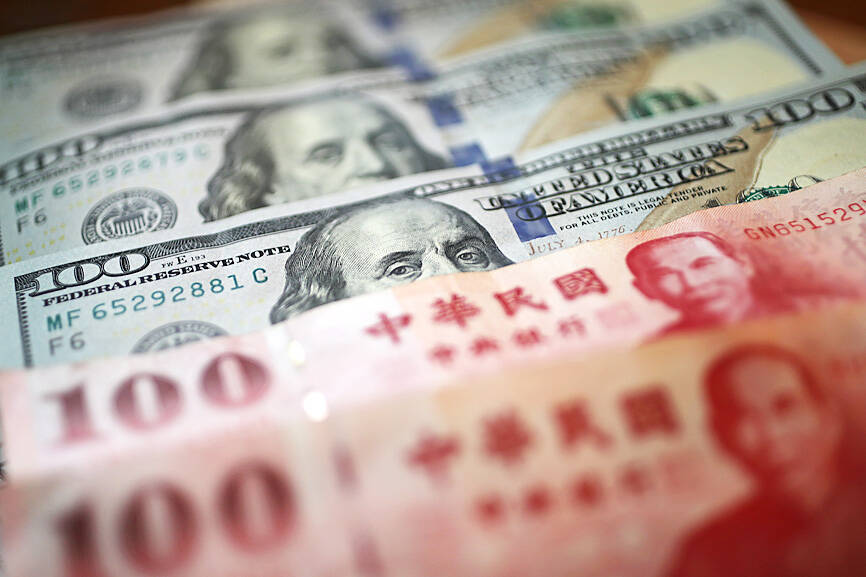Taiwan’s foreign exchange reserves were US$576.85 billion at the end of last month, a monthly decline of US$1.08 billion as the US dollar appreciated and weighed on the holdings in other major currencies ahead of the US presidential election, Central Bank Department of Foreign Exchange Director-General Eugene Tsai (蔡炯民) said yesterday.
The global markets had mostly priced in the possible outcomes of the US election and would shift their focus back to economic fundamentals in the US in the absence of lingering uncertainty, such as happened in 2000, Tsai said.
Opinion polls showed that former US president Donald Trump and US Vice President Kamala Harris were locked in a tight race ahead of yesterday’s vote, but the yield rate for US government bonds rose to 4.25 percent yesterday and the US dollar index increased 3.17 percent last month, reflecting what market analysts call “Trump trade,” Tsai said.

Photo: CNA
It is widely believed that a Trump victory would bolster the US dollar and weigh on other currencies, while a Harris win could prompt a rapid retreat of the greenback.
That explained why the central bank’s positions in other major currencies took a hit after the euro weakened 3.5 percent, the Canadian dollar shed 2.92 percent, the Australian dollar lost 5.34 percent and the yen fell 7.1 percent from the previous month, Tsai said.
The New Taiwan dollar was comparably stable, with a monthly drop of 1.27 percent as foreign institutional investors increased holdings in local shares by NT$39 billion (US$1.22 billion) in the month, he said.
Securities investments and deposits held by foreign investors reached a new high of US$844.3 billion, equivalent to 146 percent of foreign exchange reserves, he said.
The investment moves came after major Taiwanese tech firms delivered strong third-quarter results on the back of avid global demand for electronics used in the development of artificial intelligence (AI) applications.
Those firms are expected to benefit further from the AI boom in the near future, even if US policy changes, which would take several months to materialize, Tsai said.
A Harris White House is expected to keep policy largely as it is, while a Trump administration could usher in stiff tariffs on exports from around the world. The US is Taiwan’s second-largest trade partner behind China.
Still, the central bank observed capital outflows in the form of capital gains and cash dividends, Tsai said.
Taiwan remained the world’s fifth-largest holder of foreign exchange reserves after China, Japan, Switzerland and India, the central bank said.

The US dollar was trading at NT$29.7 at 10am today on the Taipei Foreign Exchange, as the New Taiwan dollar gained NT$1.364 from the previous close last week. The NT dollar continued to rise today, after surging 3.07 percent on Friday. After opening at NT$30.91, the NT dollar gained more than NT$1 in just 15 minutes, briefly passing the NT$30 mark. Before the US Department of the Treasury's semi-annual currency report came out, expectations that the NT dollar would keep rising were already building. The NT dollar on Friday closed at NT$31.064, up by NT$0.953 — a 3.07 percent single-day gain. Today,

‘SHORT TERM’: The local currency would likely remain strong in the near term, driven by anticipated US trade pressure, capital inflows and expectations of a US Fed rate cut The US dollar is expected to fall below NT$30 in the near term, as traders anticipate increased pressure from Washington for Taiwan to allow the New Taiwan dollar to appreciate, Cathay United Bank (國泰世華銀行) chief economist Lin Chi-chao (林啟超) said. Following a sharp drop in the greenback against the NT dollar on Friday, Lin told the Central News Agency that the local currency is likely to remain strong in the short term, driven in part by market psychology surrounding anticipated US policy pressure. On Friday, the US dollar fell NT$0.953, or 3.07 percent, closing at NT$31.064 — its lowest level since Jan.

The New Taiwan dollar and Taiwanese stocks surged on signs that trade tensions between the world’s top two economies might start easing and as US tech earnings boosted the outlook of the nation’s semiconductor exports. The NT dollar strengthened as much as 3.8 percent versus the US dollar to 30.815, the biggest intraday gain since January 2011, closing at NT$31.064. The benchmark TAIEX jumped 2.73 percent to outperform the region’s equity gauges. Outlook for global trade improved after China said it is assessing possible trade talks with the US, providing a boost for the nation’s currency and shares. As the NT dollar

The Financial Supervisory Commission (FSC) yesterday met with some of the nation’s largest insurance companies as a skyrocketing New Taiwan dollar piles pressure on their hundreds of billions of dollars in US bond investments. The commission has asked some life insurance firms, among the biggest Asian holders of US debt, to discuss how the rapidly strengthening NT dollar has impacted their operations, people familiar with the matter said. The meeting took place as the NT dollar jumped as much as 5 percent yesterday, its biggest intraday gain in more than three decades. The local currency surged as exporters rushed to